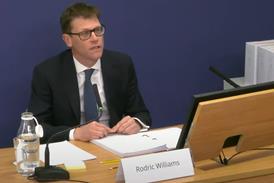The Legal Services Consumer Panel today steps up its campaign for the Legal Services Ombudsman to take on complaints about lawyers from people other than clients by publishing a set of ‘real horror stories’.
As examples, it picked 37 anonymised case studies from 2,184 third-party complaints received by the ombudsman last year. While the panel did not indicate which should have been accepted for investigation it hoped that the case studies would ‘provoke thought and bring real life examples to this extremely important debate’.
The consumer watchdog proposed in June last year that the ombudsman’s remit be expanded to take on third-party complaints. The Law Society was highly critical, saying that lawyers owe their duties to their clients and that enabling third parties to receive redress from solicitors who owe them no duty would introduce a potential conflict.
Nine of the case studies published today involved conveyancing, nine were complaints by people being pursued for debts, six for experiences in courts and tribunals, six concerned family cases, six probate and power of attorney and one insolvency. Allegations ranged from failure to communicate to ‘shouting, threatening, stamping… and doing her absolute best to intimidate and frighten’.
Accepting that, in an adversarial system lawyers have to act ‘robustly’ on behalf of their client, the panel said the current system where the ombudsman must reject all third-party complaints is ‘too crude’.
Elisabeth Davies, the consumer panel’s chair, said: ‘The case studies include some real horror stories where consumers have been badly let down by lawyers, but then find the legal ombudsman cannot help them.
‘The panel accepts that not all third-party complaints should be investigated, but the current blanket ban on all such complaints is plainly wrong. We look forward to working constructively with stakeholders to identify the right way forward, so that redress for consumers can be sensibly extended.’
Adam Sampson, chief legal ombudsman, said his office would ‘be working on proposals for how we deal with third-party complaints over the coming months’.
The panel’s paper is available here.

















![David Lester (senior partner at Blythe Liggins), Darryl Barnes, Jagdeep Sandher (head of dispute resolution at Blythe Liggins)[4]](https://d1d8vslyhr7rdg.cloudfront.net/Pictures/274x183/4/2/8/116428_davidlesterseniorpartneratblytheligginsdarrylbarnesjagdeepsandherheadofdisputeresolutionatblytheliggins4_981603_crop.jpg)






37 Readers' comments